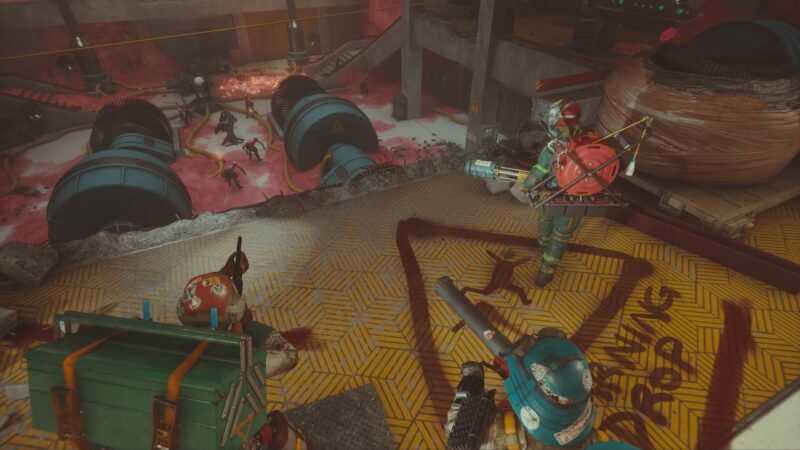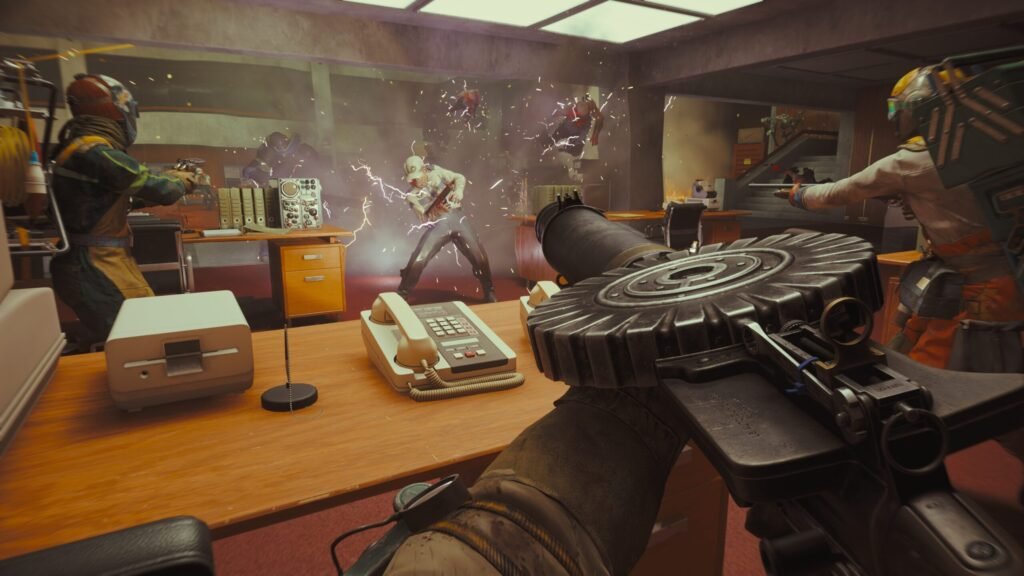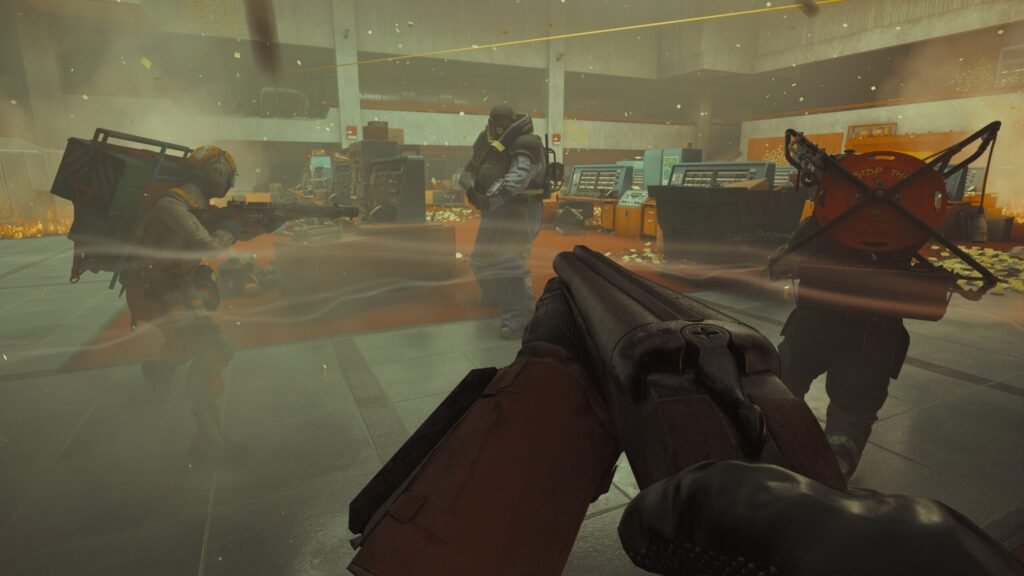When FBC: Firebreak was originally announced, Remedy Entertainment’s first outing into the cooperative shooting genre was met with a few question marks, but most people brushed that aside when they learned the game would be based on the universe of major titles like Control and Alan Wake.
At launch, the game even attracted over a million players across platforms (it was available as a Day-1 release on PlayStation Plus, Xbox Game Pass and Steam), which is usually an indication of impending success.
And then…it slumped. Hard. While its launch week saw a peak of 1,992 simultaneous players (its highest number so far), the last couple of days have shown numbers no larger than 25. In percentage numbers, we’re talking about a nearly 99% drop—in two months.
Note: Affiliate Disclosure: At PlayRatedGames, our content is made possible by our readers. If you purchase a game or product through links on our site, we may receive a small commission. This support helps us continue publishing honest, independent reviews. Our recommendations are based solely on what we believe offers real value to players — never influenced by affiliate partnerships.
However, given the game’s current standing as “mixed” on its public reception and a Metacritic score in the mid-60s, with user scores and other aggregators reflecting that perception, Remedy Entertainment is not giving up on it: as stated by the studio’s own financial report, it plans to kick marketing efforts into high drive, taking advantage of a “major update” planned for September.
Which begs two questions: what went wrong with FBC: Firebreak in the first place, and what can be done to turn its luck around?
FBC: Firebreak’s chance at success
High Hopes, Rocky Start
Remedy first teased the project in 2021, but officially revealed FBC: Firebreak in October 2024. Released in July of that same year, the game is a cooperative, online first-person shooter set in the same universe of games like Alan Wake and Control. Unlike those two brands, however, FBC: Firebreak’s take is more lightly-toned, colorful and relying more on the fun side rather than betting on the somber narrative and psychological horror of its older siblings.
Gameplay-wise, the mechanics are pretty solid, albeit light on content: joined in teams of three, players take on replayable missions—or “Jobs”—purging reality-bending threats. The great thing about this game is the fact that it does not rely on the most egregious, money-making schemes a lot of its peers in this genre do: Firebreak has no battle passes, no daily logins, no FOMO (“fear of missing out”) content… It is designed to be picked up and played quickly, and most if not all missions are available for free.
However, early reviews from both the critic and more engaged users labeled said missions as lifeless, repetitive and bland. Despite praising the change in atmosphere if compared to Control and Alan Wake, FBC: Firebreak’s woes come from the fact that it lacks engagement, which led to its major player drop off.

Subscriptions or Direct Sales
Strictly speaking, FBC: Firebreak failed commercially. That’s not us dunking on the game, by the way, but Remedy’s own recognition through its latest financial report. CEO Tero Virtala admits it himself:
“Commercially, we were unsatisfied with the launch-phase consumer sales of FBC: Firebreak. Thus far, FBC: Firebreak’s commercial performance has largely been driven by the Xbox and PlayStation subscription service agreements. A considerable portion of the revenues from these agreements will still be recognized throughout the contract period.”
Let’s break it down:
- Over 1 million players sampled Firebreak within the first 10 days, largely driven by free trials on Xbox Game Pass and PlayStation Plus.
- Peak concurrent players on Steam during launch week peaked just under 2,000 players, indicating limited sustained engagement on the primary direct sales platform.
- Total revenue increased 63.5% year-over-year, reaching €16.9 million in Q2 2025 (up from €10.3 million in Q2 2024).
- Despite revenue growth, Remedy reported a slight operating loss of €0.5 million in Q2 2025, an improvement over a larger loss of €3.2 million in Q2 2024.
- Steam, intended as the primary sales channel for full-price consumer purchases, “underperformed” compared to Remedy’s internal expectations.
- Revenue was “largely driven” by agreements tied to Xbox Game Pass and PlayStation Plus subscription platforms.
- Subscription revenues are recognized over time per contract terms, rather than as immediate full purchase revenue.
- Metacritic score around 65 (mid-60s), with approximately 36-40% of critics recommending the game.
- Steam reviews improved to roughly 60-70% positive after initial launch negativity, with about 1,685 Steam reviews tracked by July.

Now, we don’t mean to get all technical here, but essentially, FBC: Firebreak’s relying on direct sales first is largely a reason for its perceived flop. While being available as a Day-1 release on all major online platforms (again: PS Store, Game Pass), these offers amount to little on Remedy’s overall revenue. That’s where Steam was supposed to come into play.
You see: Valve’s storefront is free for all, and games sold there are direct sales—it’s essentially the same as if you bought the actual, physical copy in a store shelf, except through a paid download. And direct sales are made on full price ($39.99 in this case), which nets more gains for Remedy.
And yet, Steam people didn’t buy it.
Remedy reported that although the game attracted over 1 million players within the first 10 days, this number actually came from console players (a.k.a “subscription based”) while numbers on Steam were initially interesting, albeit nothing to be impressed about at under 2,000 concurrent players.
So what does this mean in practical terms? Well, despite growing in overall revenue, Remedy Entertainment’s still lost money because of FBC: Firebreak: described as “unsuccessful” and “commercially unsatisfied,” the game’s launch underscores an important trend—subscription services can deliver large player counts and early exposure, but do not always translate to strong direct sales or retained player bases.
That part would depend on Remedy’s own development of the game (it’s the “lack of engagement” part we mentioned a few paragraphs above: essentially, gamers got interested initially, lost interest quickly when they realized the content was bland). And in this part, the company seems to have failed.

The Road Ahead
Now here is where Remedy Entertainment earns back the praise it became known for: instead of just cutting their losses and moving on to another project, the company decided to double down on FBC: Firebreak’s concept, showing commitment to an extensive, ongoing support by way of a major content update planned for September 2025.
Not only that, the brand’s also getting a large marketing effort made of targeted actions in order to rekindle player interest and not only stabilize its community, but grow it.
Granted, that’s not a recipe for automatic success: for all effects and purposes, “reverting situations” is possible from both angles—change a bad luck run into something favorable; doing something so wrong you quickly destroy a much fought for success, they’re all sides of the same coin. But when it comes to player retention, this is even more difficult, as players who moved on from something seldom look back to it.
In other words, Remedy Entertainment is facing an uphill battle—one where the end result will largely depend on September’s update: the company did not offer any detail on what that content will bring, but it has stated that its overall focus will be on improving game and mission design—both were hot topics for most players—as well as quality of life improvements and overall gameplay mechanics and optional cosmetics.
So at the very least, Remedy’s heart is in the right place, and unlike a lot of companies facing the same situation, the studio has an actual, solid plan laid out to revert this unfavourable scenario. And it would have reason not to be, if that was the case: Remedy is still developing Control 2 and remaking Max Payne 1 and 2, after all, and both are major projects in their own right.
The industry and the community will remain cautious, but sometimes, it pays to be hopeful


